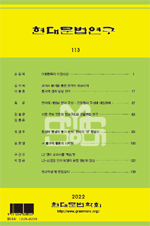This paper first observes the sharp semantic difference between the -ta ending sentences and the -e/a ending sentences in Korean. Based on the observation that the -ta ending sentences are statement delivered through declaratives while the -e/a ending sentences are directly addressed to the hearer, regardless of their sentence types, this study argues that -e/a is not an imperative sentence ending but a direct address marker, which has not hitherto been recognized in Korean linguistics. This paper clearly shows that any sentence directly addressed to the hearer ends with the -e/a ending, no matter whether it is a declarative, interrogative, or imperative form. It further develops this observation and shows that -e/a is a direct address marker, -la an indirect address marker, and the complex form [-e/a la] a combination of direct and indirect addressing, which induces pragmatic effect of attenuating the directness of -e/a.
1. Introduction
2. Hearer-Addressed vs. Non-Hearer-Addressed Sentences
3. Constructions Directly Addressed
4. Imperative Interpretation in Korean
5. Indirect Address Marker -la and the Complex Form [-e/a la]
6. Summary and Implication
Reference
